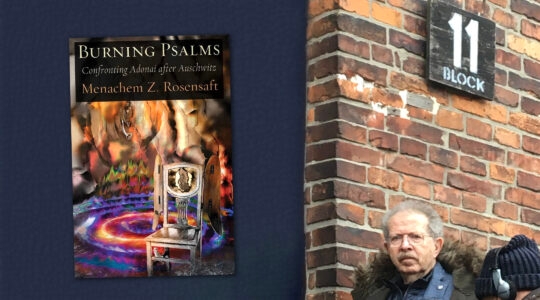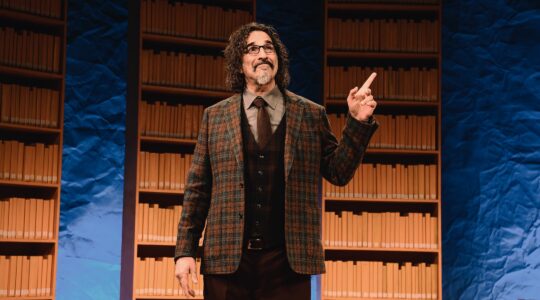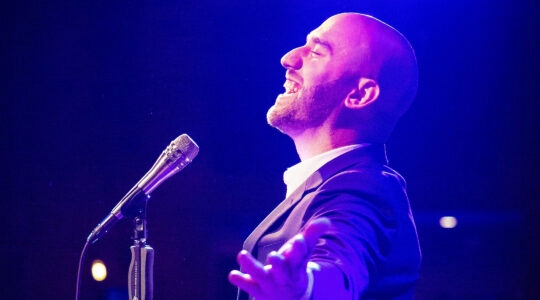OK, OK, I’m a little late this week. Blame it on a multi-day (beat that Don Draper) power nap.
There wasn’t much Ginsberg to talk about in Sunday’s episode, “Lady Lazarus.” So let’s get that out of the way. First, I’m still not sure what to make of his “Did he fire you? That son of a bitch…” line. Joking or serious? Sarcastic or chivalrous? Cynical or clueless? Seems like the earnest type. So I’m going with serious, chivalrous and clueless.
And now for this week’s Ginsberg overdone moment… “I’ll tell you what takes guts — never having money for lunch. She owes me like $15 at this point.”
Actually this is a double fault: Foul number one, of course, is the writers yet again handling the whole Ginsberg-Jewishness thing with the subtlety of a bad Shabbos wine. Even worse, though, is that this time there is collateral creative damage — is there any way you see Megan racking up a $15 lunch tab with struggling Jewish copywriter guy? What is she, Pete Campbell or Harry Crane? Come on, she’s one of the good ones, with a devotion to detail to boot. So I’m not buying it. She’d be more likely to pack Ginsberg a nice Frenchy lunch every day and buy him a decent blazer then to mooch off of him.
On to less Jewy, more consequential moments… Don looking down the elevator hole. As one reader put it: “Don is staring into an abyss, fearing that he will once again be in a marriage where he feels empty and alone. Also using the metaphor of the elevator, ‘Is the bottom dropping out’? Will Megan’s decision be the death of the marriage? The tone is clearly ominous and foreboding, one of impending doom. Is this also the beginning of the end of his reign as creative wunderkind. Is Don going to lose his relevance at work and at home?”
He’s worrying about all of the above, I’d say. [[READMORE]]
On the personal side, give Don some credit. When Megan first woke him up in the middle of the night to break the news that she wanted to quit advertising and go back to acting, he was clearly unhappy and teetering on the edge of a classic Don Draper verbal smackdown. Whether his holding it in reflects respect for Megan’s choices or a realization that she couldn’t be bullied out of them like Betty, the guy got it right. And by the time he finds himself on his office couch, he’s sounding a pretty enlightened note about the whole thing — a Roger-like moment of Zen (and he didn’t even need LSD to get there).
But I’m more interested in the work side of the equation — the self-doubt and anxiety Don is feeling over whether he can keep up/evolve without his muse and reference point for the changing world that he doesn’t quite get or feel comfortable with.
And on that point (let’s hope this tangent pays off and gets us to the Beatles)… since series creator Matt Weiner worked on “The Sopranos,” and then “Mad Men” came along just in time to fill the void left by Tony’s going dark, there’s been a tendency to compare the two shows and their protagonists. The conventional wisdom is Don Draper = Tony Soprano. Yes, one’s in advertising, the other’s a mobster — but at heart they’re just two guys figuring out how to balance volatile home and work situations.
While the comparison works on several levels, I’ve always felt it misses a key distinction. Yes, Tony and Don are both masters of the universe at work. The difference is that Tony outduels his rivals in part because he’s not hampered by any Old World sensibilities, loyalties or inhibitions. Ralph, Johnny Sack, Furio, etc. — they are all in some way trying to hold on to what was, grasping for some sense of honor among thieves, to the belief that the rules of the game must be adhered to. Not Tony. He is Americanized, willing and able to do what he needs to do — to earn, to enjoy, to survive.
Don is more like the old Dons. He’s spent years fighting to be the best of what turns out to be a dying world. And it’s unclear whether he can adapt, whether he will forge a new world with the young guns that he manages to attract or end up with Burt Cooper on a sinking cultural ship. Don has his charms, and then some. But the next creative frontier will belong to the folks who voted for JFK and rooted for Ali, not Nixon and Liston. It will belong to those who embrace edgy and dark, and can wrap their heads around America’s rapidly changing cultural and demographic landscapes. If you’re confused, even more than that — unsettled — by the Rolling Stones and the Beatles, you’re in trouble.
Ah, yes, the Beatles. See Don, you can relax about Megan. Your personal growth has been rewarded. She’s still got your cultural back — making time to get you a Fab Four album before rushing off to acting class.
And then it ends, with Don (or is it just us?) hearing the lyric from “Tomorrow Never Knows” again and again… “It is not dying.” “It is not dying.” “It is not dying.”
Don must have been doing a lot of chewing on that song — it hits even closer to home then that one line lets on:
Turn off your mind, relax and float down stream
It is not dying, it is not dyingLay down all thoughts, surrender to the void,
It is shining, it is shining.
Yet you may see the meaning of within
It is being, it is being
Don looks down the elevator shaft, imagines losing himself, his hold on the world, and sees a dark void. Embrace the mystery, the song is shouting back at him. Roll with it. Look past the darkness, and you’ll see the light. You might even find meaning. That’s not descending toward death, it’s the only way in this new world to live life along the way.
I would argue that it’s the same message of “Don’t Stop Beliving,” the song Tony picks from the jukebox in the last scene of “The Sopranos.”
Just a small town girl
Livin’ in a lonely world
She took the midnight train goin’ anywhereJust a city boy
Born and raised in south Detroit
He took the midnight train goin’ anywhere
A singer in a smoky room
A smell of wine and cheap perfume
For a smile they can share the nightIt goes on and on and on and on
Strangers waiting
Up and down the boulevard
Their shadows searching in the nightStreetlight people
Living just to find emotion
Hiding somewhere in the nightWorking hard to get my fill
Everybody wants a thrill
Payin’ anything to roll the dice just one more time
Some will win, some will lose
Some were born to sing the blues
Oh, the movie never endsIt goes on and on and on and on
Strangers waiting
Up and down the boulevard
Their shadows searching in the nightStreetlight people
Living just to find emotion
Hiding somewhere in the nightDon’t stop believin’…
The world we live in is a hustle filled with hustlers. That’s not a good thing or bad thing, it’s just the way it is. And the winners are the ones who internalize this reality and aren’t afraid to place their bets. They don’t need to know where they’re going and they can get by without knowing when or how the highs will come, and are willing to find meaning in them no matter how shallow or fleeting.
And how Don and Tony relate to their respective songs says it all.
Megan selects the song for Don, he listens to it alone and struggles with it. Tony picks his song himself, is sitting happily with his family and enjoying the onion rings.
So, yes, maybe a few seconds after things go black, Tony will be dying. But for now he’s living.
Don could still go either way.
JTA has documented Jewish history in real-time for over a century. Keep our journalism strong by joining us in supporting independent, award-winning reporting.






